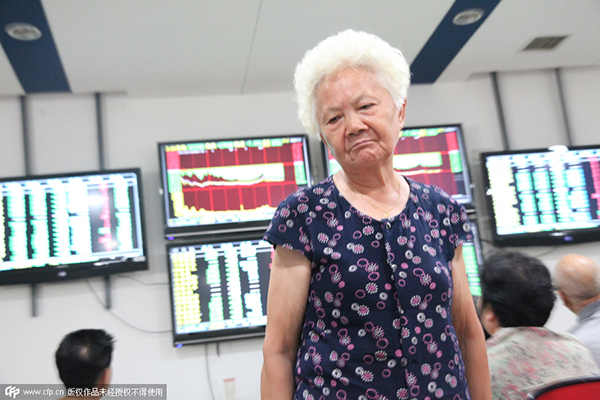Only real economic growth can calm stock market turmoil
By Zhu Qiwen (China Daily) Updated: 2015-08-27 07:46
 |
|
An investor stands in front of a screen displaying stock indices and prices of shares, as stock index plunged 8.46 percent, at a stock brokerage house in Yichan city, China's Hubei province, Aug 24, 2015. [Photo/CFP] |
If the ongoing turbulence in the global stock markets, the Chinese stock market in particular, is a cause for alarm, increasing uncertainties about the prospects for global growth justify urgent measures to shore up economic growth.
The latest monetary easing by China's central bank should be more than welcome in the light of the importance of a healthy Chinese economy not only for the global recovery but also investor confidence at home and abroad.
After two consecutive days of 8 percent losses in the Chinese stock market, the sharpest two-day plunge in about two decades, the People's Bank of China announced cuts in interest rates and the amount of reserves banks must hold on Tuesday; the second round of cuts in two months.
However, the initial response did not seem encouraging. In the US stock market, concerns about China's economy resulted in the major indices turning negative in the final minutes of trading on Tuesday, after previously climbing almost 3 percent.
While domestically, the performance of the benchmark Shanghai Composite index, which failed to retake the psychologically important threshold of 3,000 points on Wednesday, indicated that China's central bank had achieved little in cheering up nervous investors.
For those who have expected the Chinese government to stand against the tide to lift share prices, they may feel disappointed about the latest move. Actually, some of them even blamed the plunge in Chinese stocks on the government being too tardy with its rescue efforts.
Yet, should Chinese policymakers try to put a floor under the market again or just let the investors thrash out the true value of Chinese stocks? Since Chinese share prices are still about one-third higher than a year ago, it is hard to tell if the stock market rout will come to an end any time soon.
- Influence of China's stock market plunge 'limited': French minister
- The look of despair in stock market
- Pension fund to ballast stock market
- Chinese stock market plunges 3.42%
- State-owned companies lead the slump as stock market dives 6%
- Stock market volatility is normal
- China's efforts to stabilize stock market pay off: experts

I’ve lived in China for quite a considerable time including my graduate school years, travelled and worked in a few cities and still choose my destination taking into consideration the density of smog or PM2.5 particulate matter in the region.











